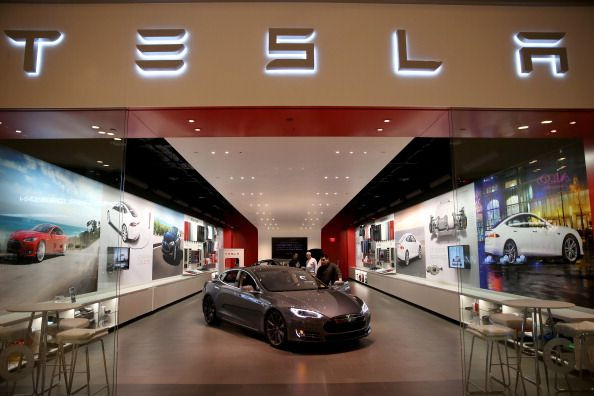Tesla Motors Inc (TSLA) Q1 Earnings Preview: What To Watch In The Model S Maker's Q1 Results

UPDATE May 6, 5 p.m. EDT: Read the Tesla Motors' first-quarter earnings results here.
Original story begins here:
Days after Tesla Motors Inc. said it will begin delivering this summer its Powerwall home energy storage batteries, the company is set to release first-quarter earnings results on Wednesday after markets close. The financial report and follow-up conference call with CEO Elon Musk will offer the latest snapshot of the company’s main business: making and selling luxury electric cars.
“Heading into the earnings call, we continue to look for more details surrounding Model X execution -- in particular, launch timing, speed of ramp and order back log,” Morgan Stanley said in an April 14 research note, underscoring the importance of Tesla’s upcoming electric crossover SUV.
Shareholders will ignore profit losses in the report so long as the company hits revenue targets for the first three months of the year, and they will look to see whether Model X is progressing. A small number of deliveries are expected out in the July-September quarter, with as many as 3,000 Model X deliveries in the last three months of the year.
Tesla Motors' (Nasdaq:TSLA) share price closed up nearly 2 percent to $230.51 on Monday after Credit Suisse analysts issued a bullish research note on how its venture into energy storage systems will work seamlessly with the company’s electric car ambitions.
Here are five important issues to look for in Musk’s letter to shareholders, Tesla’s earnings statement and the conference call.
1. Did Tesla deliver expected earnings numbers? Tesla is forecast to report first-quarter revenue of $1.04 billion, up from $620.5 million last year, according to Monday’s analysts forecast from Thomson Reuters. Net loss is seen widening to $115.1 million, from a loss of $49.8 million in the year-ago period. Fully reported per-share losses are expected to widen to 89 cents, from a loss of 40 cents last year. Nobody expects Tesla to be profitable anytime soon, but if Tesla misses on revenue, the stock will take a hit. If it beats, the bulls will rally as long as there isn’t bad news tucked elsewhere in the earnings.
2. Will Tesla provide new guidance on sales? The company changed the way it reports sales numbers, so we already know that in the first quarter the company delivered 10,030 vehicles to its customers, including 1,400 Model S cars whose deliveries were delayed because of weather and customers on vacation. This means deliveries were lifted in the quarter. Tesla says it can deliver 55,000 vehicles this year, or almost 15,000 cars per quarter for the rest of the year. Some analysts are already adjusting the number down. Tesla could either maintain this 55,000-vehicle goal, which would be good news, or lower it, which would be bad.
3. Tesla’s mounting debt. Absolutely vital to the company’s progress is how it will continue to finance operations. “Servicing our convertible senior notes requires a significant amount of cash, and we may not have sufficient cash flow from our business to pay our substantial debt,” the company said in its 2014 annual report. Tesla ended 2014 with three convertible notes (corporate bonds that can be converted into stock at a later date) totaling $3.12 billion. Tesla CFO Deepak Ahuja will likely be asked about the company’s efforts to raise more money for ongoing efforts, including fully financing the $5 billion “gigafactory” battery manufacturing plant it’s building east of Reno, Nevada, and the expansion of its global marketing, servicing and battery-charging networks. Cash flow is increasingly a problem for the car company, and it will need to explain its financing plans.
4. How will pre-owned Tesla Model S cars impact Tesla revenue? Tesla began selling certified pre-owned Model S cars on its website last week. Expect Musk or Ahuja to discuss the company's expectations for the nascent new business. The price of used Model S cars is an important issue for Tesla, which offers customers a buyback-price guarantee for cars leased through the company’s own financing division. Future obligations will be determined by how much customers will pay for used Model S cars.
5. How will Tesla’s home, business and microgrid energy storage systems affect the company’s core business? Following Tesla’s announcement last week, investors and analysts will want to know how the battery business will intersect with the car business. On Monday, Credit Suisse analysts were bullish that the energy storage system will work seamlessly with the company’s car business. “Over time, we expect the market will recognize that battery-system engineering is a core competency of Tesla's and we see development of what seems to be a cutting edge energy storage battery as a further proof-point,” said the Credit Suisse research note.
© Copyright IBTimes 2025. All rights reserved.






















